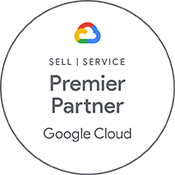 4 day course
4 day course  Partner of the Year
Partner of the Year  Virtual, Private
Virtual, Private  Certificate of Attendance
Certificate of Attendance As a Google Cloud Partner, we’ve been selected to deliver this four-day Data Engineering course.
Our expert Cloud trainers will combine presentations and demos with practical, lab-orientated workshops to teach you the steps required to design data processing systems. You’ll learn how to build end-to-end data pipelines, analyse data and carry out machine learning.
The course covers structured, unstructured, and streaming data, so if you’re a budding Data Engineer, you’ll leave with the ability and confidence to be able to apply your new skills to a variety of scenarios and datasets.
Our Data Engineering on Google Cloud course is delivered via Virtual Classroom. We also offer it as a private training session that can be delivered virtually or at a location of your choice in the UK.
This course is an intermediate-level course. If you’re looking to master the basics, you would benefit from our Google Cloud Fundamentals: Big Data & Machine Learning course.
Want to combine the two? Take a look at our Professional Data Engineer track, which will get you on track to obtaining the Google Data Engineer certification.
Course overview
Who should attend:
This course is intended for developers who are responsible for:
- Extracting, loading, transforming, cleaning, and validating data
- Designing pipelines and architectures for data processing
- Integrating analytics and machine learning capabilities into data pipelines
- Querying datasets, visualising query results, and creating reports
What you'll learn:
By the end of this course, you will be able to:
- Design and build data processing systems on Google Cloud
- Process batch and streaming data by implementing autoscaling data pipelines on Dataflow
- Derive business insights from extremely large datasets using
- BigQuery
- Leverage unstructured data using Spark and ML APIs on Dataproc
- Enable instant insights from streaming data
- Understand ML APIs and BigQuery ML, and learn to use AutoML to create powerful models without coding
Prerequisites
To benefit from this course, participants should have completed our Google Cloud Fundamentals: Big Data & Machine Learning course or have equivalent experience. You should also have:
- Basic proficiency with a common query language such as SQL
- Experience with data modelling and ETL (extract, transform, load) activities
- Experience with developing applications using a common programming language such as Python
- Familiarity with machine learning and / or statistics
Course agenda
- Analyse data engineering challenges
- Introduction to BigQuery
- Data lakes and data warehouses
- Transactional databases versus data warehouses
- Partner effectively with other data teams
- Manage data access and governance
- Build production-ready pipelines
- Review Google Cloud customer case study
- Lab: Using BigQuery to do Analysis
- Introduction to data lakes
- Data storage and ETL options on Google Cloud
- Building a data lake using Cloud Storage
- Securing Cloud Storage
- Storing all sorts of data types
- Cloud SQL as a relational data lake
- The modern data warehouse
- Introduction to BigQuery
- Getting started with BigQuery
- Loading data
- Exploring schemas
- Schema design
- Nested and repeated fields
- Optimising with partitioning and clustering
- Lab: Loading Data into BigQuery
- Lab: Working with JSON and Array Data in BigQuery
- EL, ELT, ETL
- Quality considerations
- How to carry out operations in BigQuery
- Shortcomings
- ETL to solve data quality issues
- The Hadoop ecosystem
- Run Hadoop on Dataproc
- Cloud Storage instead of HDFS
- Optimise Dataproc
- Lab: Running Apache Spark jobs on Dataproc
- Introduction to Dataflow
- Why customers value Dataflow
- Dataflow pipelines
- Aggregating with GroupByKey and Combine
- Side inputs and windows
- Dataflow templates
- Dataflow SQL
- Lab: A Simple Dataflow Pipeline (Python/Java)
- Lab: MapReduce in Dataflow (Python/Java)
- Lab: Side inputs (Python/Java)
- Building batch data pipelines visually with Cloud Data Fusion
- Components
- UI overview
- Building a pipeline
- Exploring data using Wrangler
- Orchestrating work between Google Cloud services with Cloud Composer
- Apache Airflow environment
- DAGs and operators
- Workflow scheduling
- Monitoring and logging
- Lab: Building and Executing a Pipeline Graph in Data Fusion
- Optional Lab: An introduction to Cloud Composer
- Process Streaming Data
- Explain streaming data processing
- Describe the challenges with streaming data
- Identify the Google Cloud products and tools that can help address streaming data challenges
- Introduction to Pub / Sub
- Pub / Sub push versus pull
- Publishing with Pub / Sub code
- Lab: Publish Streaming Data into Pub / Sub
- Steaming data challenges
- Dataflow windowing
- Lab: Streaming Data Pipelines
- Streaming into BigQuery and visualising results
- High-throughput streaming with Cloud Bigtable
- Optimising Cloud Bigtable performance
- Lab: Streaming Analytics and Dashboards
- Lab: Streaming Data Pipelines into Bigtable
- Analytic window functions
- Use With clauses
- GIS functions
- Performance considerations
- Lab: Optimising your BigQuery Queries for Performance
- Optional Lab: Partitioned Tables in BigQuery
- What is AI?
- From ad-hoc data analysis to data-driven decisions
- Options for ML models on Google Cloud
- Challenges dealing with unstructured data
- ML APIs for enriching data
- Lab: Using the Natural Language API to Classify Unstructured Text
- What’s a notebook?
- BigQuery magic and ties to Pandas
- Lab: BigQuery in Jupyter Labs on AI Platform
- Ways to do ML on Google Cloud
- Vertex AI Pipelines
- AI Hub
- Lab: Running Pipelines on Vertex AI
- BigQuery ML for quick model building
- Supported models
- Lab option 1: Predict Bike Trip Duration with a Regression Model in BigQuery ML
- Lab option 2: Movie Recommendations in BigQuery ML
- Why AutoML?
- AutoML Vision
- AutoML NLP
- AutoML tables


